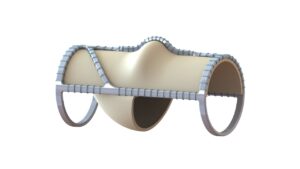
Positive long-term, three-year observational data from a cohort of patients that participated in the previously concluded VenoValve (Envveno Medical) first-in-human clinical trial were recently presented at the VEITHsymposium 2022 (Nov. 15–19) in New York City.
Principal investigator Jorge Hernando Ulloa, MD, from University of the Andes in Bogota, Colombia, reported that the VenoValve patients, who are now an average of 36 months post VenoValve implantation, continue to benefit from the VenoValve and have experienced no relapses of severe chronic venous insufficiency (CVI) and no recurrences of venous ulcers. Safety events were limited to one thrombosis after discontinuation of anticoagulation medication.
The presenter added that average improvements in reflux, CVI disease manifestations (revised Venous Clinical Severity Score [rVCSS]), and pain (Visual Analogue Scale [VAS]) remained stable at 63%, 52%, and 84% respectively, when compared to pre-surgery levels, for the cohort of eight patients that agreed to be followed at conclusion of the one year first-in-human trial. One patient experienced an increase in rVCSS due to dermatitis, which Ulloa noted was unrelated to the VenoValve or vascular disease.
A company press release details that the VenoValve is a first-in-class, surgically implanted replacement venous valve that is currently being evaluated in the SAVVE (Surgical Anti-reflux Venous Valve Endoprosthesis) US pivotal trial—a prospective, non-blinded, single-arm, multicenter study of 75 CVI patients.
VenoValve is intended to restore proper directional blood flow for patients with CVI of the deep veins of the leg. Envveno Medical estimates that approximately 2.5 million people in the USA that suffer from the debilitating impacts of severe deep venous CVI would be candidates for the VenoValve.










